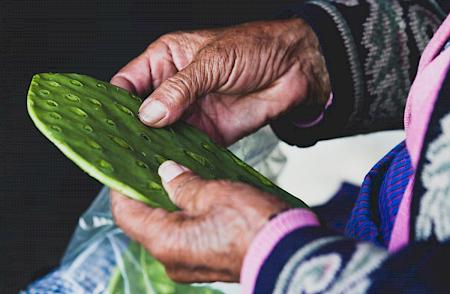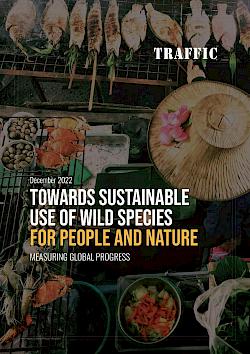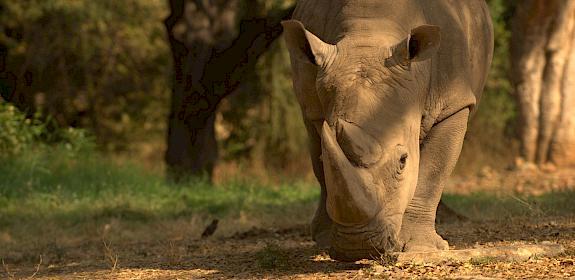Post-2020 Global Biodiversity Framework Must Ensure That Trade And Use Of Wild Species Is Legal And Sustainable
TRAFFIC urges governments and experts meeting in Montreal for the 15th meeting of the Conference of Parties to the Convention on Biological Diversity (CoP15) to agree on a transformative framework with ambitious targets and critical indicators to ensure the trade and use of wild species is legal, sustainable, and equitably benefits the planet and communities.
Our planet is in crisis. CoP15 is a once-in-a-decade opportunity for governments to drive transformative action at scale to halt and reverse biodiversity loss to be nature positive by 2030. The planet needs the adoption of an ambitious global plan to achieve a world living in harmony with nature where biodiversity is valued, conserved, restored, and wisely used, maintaining ecosystem services, sustaining a healthy planet and delivering benefits for all people.

Billions of people around the world use wild species for food, energy, materials, medicine, and well-being. IPBES Sustainable Use of Wild Species Assessment (2022) estimated that one in five people rely on wild plants, fungi and algae for their food and income. However, illegal and unsustainable trade fuels biodiversity loss threatening the status of species, ecosystems and the well-being of people who depend on wild resources for their livelihoods.
Use and trade of wild species are at the nexus of today’s most pressing conservation and development challenges and must be adequately addressed within the new Global Biodiversity Framework. Sustainable, legal and traceable trade in wild species contributes to providing social, economic, and environmental benefits to communities.”
Richard Scobey, TRAFFIC's Executive Director Global supply chains for wild species have significantly expanded in volume and value over the past decades. Stronger legal frameworks and international standards, social and behaviour change, more robust monitoring and enforcement capacity, and community empowerment are critical to reducing illegal wildlife trade. To accelerate the sustainability of production and trade, responsible consumption and supply chain transparency and traceability are essential.
All these elements need to be reflected across the Global Biodiversity Framework text, with strong operational targets and indicators within a clearly measurable monitoring framework to track and accelerate progress on implementation.”
Melanie Heath, TRAFFIC's Senior Director of the Global Programme Office
 Importantly, TRAFFIC convened a side event at CoP15, comprising representatives from several UN biodiversity Conventions, national governments and experts in science policy to look at the development of robust measurement of the progress of national and global commitments around wild species harvest, use and trade-related targets. TRAFFIC proposed the Sustainable Use of Wild Species indicator co-development process, which would enable measurement and contribute to the adaptive management of use and trade practices (and potentially serve as a headline indicator for Target 5 and other associated Targets).
Importantly, TRAFFIC convened a side event at CoP15, comprising representatives from several UN biodiversity Conventions, national governments and experts in science policy to look at the development of robust measurement of the progress of national and global commitments around wild species harvest, use and trade-related targets. TRAFFIC proposed the Sustainable Use of Wild Species indicator co-development process, which would enable measurement and contribute to the adaptive management of use and trade practices (and potentially serve as a headline indicator for Target 5 and other associated Targets).
Ambition and coherence are also needed in the Framework around the commitments to the nexus of biodiversity and health, including the effective implementation of an inter-sectoral One Health approach to operationalise practical solutions to halt biodiversity decline and improve environmental, animal and human health globally.
Given the immensity of the task at hand, the GBF will, by necessity, be an all-of-society plan, and one which will require collaboration across ministries, agencies and organisations to implement successfully. Steady progress on cross-cutting strategic and species-specific issues in international wildlife trade regulations at the CITES Conference of Parties meeting that finished last month in Panama makes CITES well poised to make a very tangible contribution to implementing the Post-2020 Global Biodiversity Framework.)
Important CITES decisions taken by Parties in Panama contribute to a growing sense of urgency for the CBD Parties to agree on targets that fully take into account all wild species of fauna, flora and fungi and encourage joined-up thinking around the systemic changes required to both reduce illegal and unsustainable trade and promote sustainable practices to reduce the threat, halt the loss and bend the curve to be nature positive by 2030.”
Anastasiya Timoshyna, TRAFFIC's Director of Strategy, Programme, and Impact
“The stakes couldn’t be higher this week to leave Montreal at the close of COP with an ambitious, truly transformative and inclusive Global Biodiversity Framework,” said Melanie Heath, and in the words of the UN Secretary-General, the opening of CoP secure an “ambitious peace pact with nature…”




